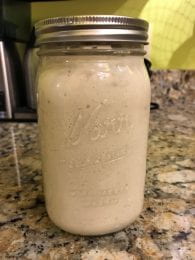
Photo: Colorado State University Extension
Want to learn how to make a sourdough starter? Fermentation is a combination of art and science. It also takes time, proper temperature, moisture, acidity, nutrients, and production of carbon dioxide.
Best practices to remember include:
- Safe food handling methods such as clean hands and equipment plus using quality ingredients.
- Flour is a raw food! Do not taste raw sourdough starter.
- Wild yeasts are inactive on their own, but activate with water. Traditional sourdough starter does not use commercial yeast.
- Take care of your starter to survive and grow. This helps stabilize microbial volume and improve the metabolic process.
Source: Food Smart Colorado